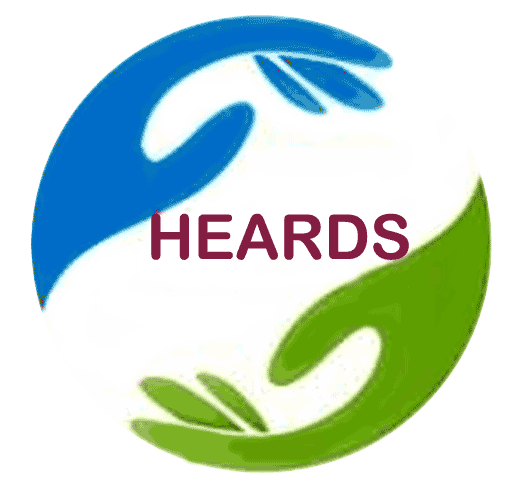Cause Area
Geographies Served
Programs
-
Rehabilitation Programme for Vulnerable Children
District
Rayagada
Chittoor
Kandhamal
States
Andhra Pradesh
Odisha
The Health Education Adoption Rehabilitation Development Society (HEARDS) has transitioned from addressing child labour to becoming a holistic organisation championing children's rights. Focusing on marginalized groups like child labourers, orphans, and individuals with special needs, it employs a comprehensive strategy, covering prevention, remediation, rehabilitation, policy advocacy, and evidence-based documentation. HEARDS rescues child labourers, supports repatriation, and operates rehabilitation centres, ensuring successful integration into mainstream schools with vigilant staff overseeing consistent attendance.
-
WASH Programme
District
Chittoor
States
Andhra Pradesh
HEARDS, since its inception, has conducted awareness programmes on water sanitation, health, and hygiene across various blocks in Chittoor District. The society has successfully implemented schemes focusing on sustainable drinking water development, including innovative rainwater harvesting techniques and roof water harvesting. It promotes alternative water schemes and advocates safe drinking water technologies like water filter plants. Ensuring proper toilet facilities in every assisted house is mandatory, aiming to sensitize communities, enhance menstrual hygiene awareness, and bring about behavioural changes for better health practices. The organisation emphasizes improving rural life quality through cleanliness, hygiene, and sanitation coverage.
-
Women Development Programme
District
Chittoor
States
Andhra Pradesh
HEARDS has actively initiated and supported the establishment of Women Self Help Groups (SHGs) in Chittoor District, as part of a comprehensive women empowerment and development programme. Each SHG, comprising 10-12 members, operates savings accounts in local banks, engaging in internal thrift and credit activities. The programme includes diverse training sessions, covering SHG concepts, leadership, Entrepreneurial Development, and various income generation strategies such as goods production, marketing, vocational training, and value-added services for sustainable women's empowerment.
-
Habitat Development Programme
District
Chittoor
States
Andhra Pradesh
HEARDS has consistently faced urgent demands for shelter, intensifying during each monsoon season with flooding, evictions, and overcrowded conditions. The society has actively invested in the housing sector, with notable achievements being the Slum Development Housing Programme in Chittoor, involving 50 houses, and various social housing schemes implemented at different intervals. HEARDS adopts a research-oriented approach, recently focusing on the concept of "housing in the barrier-free environment," aiming to provide novel housing solutions for the marginalized community's upliftment.
-
Kuriyakose
District
Chittoor
States
Andhra Pradesh
Established in 2005, HEARDS Institute, the vocational skilling arm of HEARDS, trains economically disadvantaged youth, widows, and marginalized women, aged 18-35, equipping them with employable skills. Programmes cover 10 major vocations, reaching around 300 young people in 2020-2021. Courses, lasting 6 months to 1 year, focus on rural and urban youth, emphasizing hands-on skills with industry linkages. The four-step approach includes mobilization, training, placement, and post-placement support, with a unique emphasis on post-placement tracking and support for financial sustainability. The model's success lies in its focus on post-placement services, increasing student retention in their first jobs.
Registration Details
-
PAN Card
AAATH3619J
-
Registration Number
363 of 1999
-
CSR Form 1
CSR00022210
-
80G
AAATH3619JF20013
-
12A
AAATH3619JE20013
-
FCRA
10160317
About
-
Headquarters
Chittoor, Andhra Pradesh
-
Since
1999
Impact
Health Education Adoption Rehabilitation Development Society (HEARDS) - Impact 1. Child Labor Rehabilitation Program Education and Skill Development: Hundreds of children rescued from labor are now enrolled in schools and vocational training programs, breaking the cycle of poverty and exploitation. Community Awareness: Increased awareness about the importance of education and the dangers of child labor, leading to community-driven efforts to keep children in school. 2. Water, Sanitation, and Hygiene (WASH) Program Improved Health: Access to clean drinking water and proper sanitation facilities has significantly reduced the incidence of waterborne diseases in targeted communities. Hygiene Practices: Enhanced hygiene practices have led to better overall health and well-being, especially among children and women. 3. Women Development Program Economic Empowerment: Numerous women have gained financial independence through skill development and entrepreneurship programs, improving their economic status and self-esteem. Health and Leadership: Increased knowledge about health and rights, with more women taking on leadership roles and advocating for their communities. 4. Safe Environment Programs Environmental Conservation: Community-based afforestation and waste management projects have led to greener and cleaner environments, promoting sustainability. Awareness and Participation: Greater community participation in environmental conservation efforts, fostering a culture of responsibility and care for the environment. 5. Community-Centric Approach Tailored Solutions: Programs designed based on specific community needs have led to more effective and sustainable outcomes. Empowered Communities: Building local capacity and fostering collaboration with local stakeholders have resulted in stronger, more resilient communities capable of driving their development initiatives.
Vision and Mission
HEARDS aims to eradicate illiteracy and poverty to create a better future for marginalized communities in rural India.
Political & Religious Declarations
-
Political Affiliation
-
Religious Affiliation
Location
-
Offices in Cities
Rayagada
Other Details
-
Type
Non-profit
-
Sub Type
Society
Website
Technology Adoption
-
SOC 2 Compliant
No
-
Financial Management
-
Beneficiary Management



